By Mallika Naguran
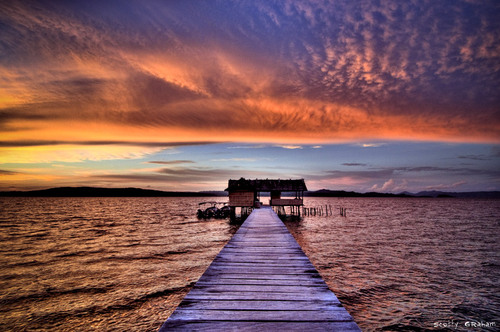
Another dazzling sunset at Kri pier when the day sighs to a close.
West Papua, 28 March 2009. Being eco can mean a number of things to different people; the first thing that springs to mind for most is the preservation of nature. For Max Ammer, a pioneer dive operator in Raja Ampat and owner of Kri Eco Resort and Sorido Bay Resort at Papua, Indonesia, people are at the heart of any ecology-related business.
“Eco to me means working with the local people to build a better future,” he tells over dinner. A gecko emerges from behind the ketchup bottles, approaching us cautiously on the wooden table. I wonder if I should remove my hand that’s resting in its path – I do love animals, but I don’t fancy my body becoming part of their habitat.
Max extends his hand out to the gecko to crawl on. “You know when I built this place 15 years ago, I didn’t have to specially rear these wild things. They just appeared – we have monitor lizards, ducks and birds just roaming around.”
Every night, following dinner, the guests gaze at the juvenile bamboo sharks wading in the shallows just below the dining lounge on stilts. In the morning, we are awakened by hysterical cackles from endemic birds such as eclectis parrots, brush turkeys, sulphur crested cockatoos and hornbills. No need for alarm clocks here.
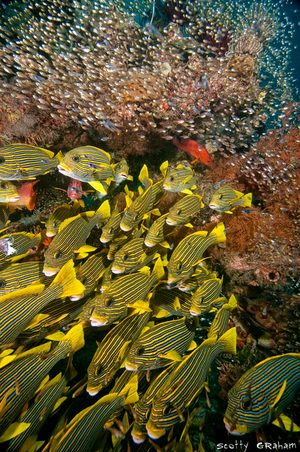
The omnipresent sweetlips.
At breakfast, we are startled to see a pair of coconut crabs huddled around a bamboo pylon at the lounge ceiling. Hideous as they are, they are also harmless and rather immobile; apparently they lie on coconut trees and love cracking the solid nuts with their rock-hard pincers. I sat a respectable distance away from them.
The guest rooms at Kri Eco Resort are also perched above the waters, so a daily sight would be numerous fish species flitting around the pylons, seeking shelter from sea currents or storms. Baby barracudas pursue parrotfish of amazing variety, tagged along by turtles.
Little of the coral reefs at Cape Kri (house reef) is destroyed with the building of Kri Eco Resort, including the jetty that Max’ father helped to build, aided by local talent and muscle. One such talent couldn’t measure straight, resulting in the construction of a not so perfect wooden platform that scuba divers walk on to get to the dive equipment center at the end of the jetty and to hop on to the dive boats.
Everything about Kri Eco Resort is handmade: the Sunset Lounge and its lazy deck chairs, the bamboo chalets, the coconut leaf and nut wall finishing and décor. Even the bricks are made by hand by the senior folks, whom Max employs, with the job title of “All Rounders”.
“I want local people to make the money,” says Max, who reveals that he could have built the resorts (including the higher-end Sorido Resort) and run the operations quicker with more experienced staff from other parts of Indonesia. In fact the dive crew are all Papuans, a number of them barely made it through school.
But Max is committed to Raja Ampat’s people in more ways that one, and its not always for business. He builds local talent and skills in this remote region of Indonesia spanning from tourism-related ventures to trades for livelihood to careers in scuba diving.
Mad Max
Max landed on Pulau Kri, part of Raja Ampat in 1992 on a motorized rubber boat. He found himself in the heart of darkness, away from civilization, close to indigenous Papuans who are warm, dark and beautiful, and this suited him fine. It reminded him of his growing up days in Nigeria though born in Holland.
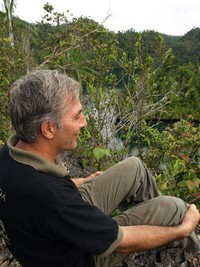
Max Ammer explores Papuan islands.
He had in the last few years explored the area for World War Two wrecks, specially commissioned by the US aviation authorities, and found quite a few aircrafts buried in silt.
Aircraft, after motorbikes, is Max’ passion. He had fiddled as an aircraft mechanic for a few years before flying one finally and is fixated with all things that fly (and more so if they crash).
Retrofitting classic Harleys as a youth, Max’ building streak has led him to design the two resorts on Kri island – based on sketching on paper – and a load of islanders to saw things and nail them together. A pinch of inspiration and a chunk of madness is all that it took to get Max Ammer going into building an eco-led business in the unknown territory of Papua.
Conservation of Raja Ampat
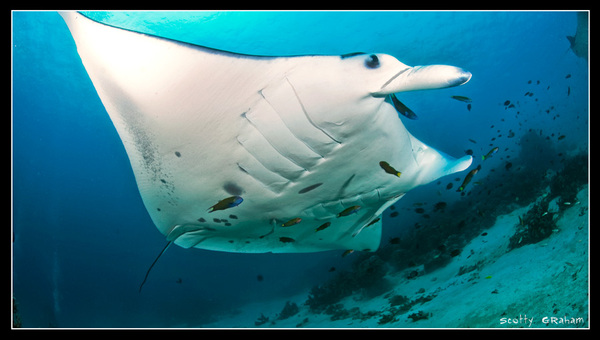
You can lose yourself swimming with the mantas here.
The pristine reefs of Raja Ampat and the plentiful marine species were under threat with destructive fishing practices such as bomb fishing and deep-sea trawlers. The big fish started to dwindle. Logging and mining on the islands impacted the waters with pollution.
Max knew he had to do something to stop the destruction and pollution. Raja Ampat needed protection, or better, conservation, or risk losing its intrinsic beauty and biodiversity. It was a stroke of luck when Dr Gerald Allen, renowned marine scientist and author, ventured into this path. Dr Allen was impressed with the numerous species of freshwater fishes found here, and the pristine state of corals. In two single dives, he recorded the highest count of fish species: 283 species at at Cape Kri and 281 at South Fam group. A benchmark for an excellent fish count is 200.
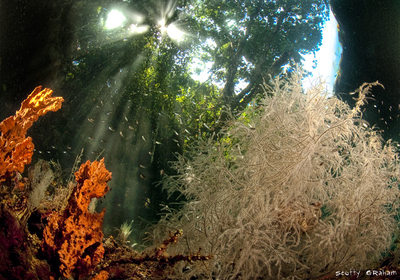
The Passage is a highlight in Papua diving.
A consultant with Conservation International (CI), Dr Allen canvassed for Papua to be considered in the organisation’s conservation programme, and after three years, in 2001, it happened. Plans for a marine park were drawn; by mid-2007, the Raja Ampat Marine Park was formally declared.
When I visited Kri Eco Resort in March 2009, I found out that the zonation and management plans were still under development, however, an important regulatory mechanism had already kicked in: the Raja Ampat Tourism Entrance Fee of Rp500,000 that involves the issue of an annual waterproof plastic entrance tag.
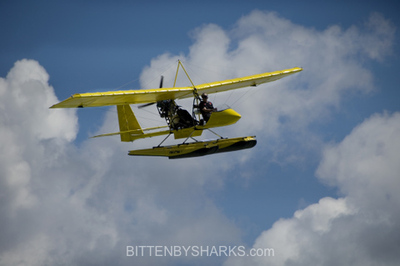
Max' passion to preserve Papua soars high.
Part of the fee goes to community development, conservation and enforcement, covering marine areas and land-based activities such as logging and mining. In 2007 and 2008, priority was given to the “Posyandu” system, which is a healthcare provision for mothers and children. Something that’s also close to Max’ heart: in the early days, he had improved the water wells in Raja Ampat with chlorination and safety measures and created 13 new wells for the people.
Conservation at Raja Ampat now is taking on new heights with an aerial monitoring programme sponsored by CI and other NGOs. This involves a light aircraft surveillance to keep an eye on illegal activities on water and land. And the pilot keeping vigil behind the wheels is no other than Max Ammer himself.
People Welfare and Development
Nikson Soor born in Batanta, Raja Ampat, is just one example of how a Papuan is groomed to become an asset in Raja Ampat tourism industry. This amiable and energetic Papuan dive master is a manager at Papua Diving with over 11,000 dives logged.
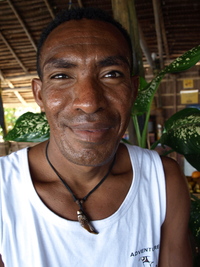
Nikson now protects turtles and more.
Nikson tells me that he first met Max when he was a wee boy, selling turtles that he had just caught with his fisherman father. Max bought those turtles from him and promptly released them. Nikson couldn’t understand this white man’s actions, but soon learnt the beauty and fragility of marine life.
“He just put a tank on me and took me down,” grins Nikson, who added, “and my eyes opened wide looking at the underwater life.” Nikson, who was just 14 then, was instantly converted.
It is the start of a long and deep friendship between the two; Nickson who is 34 years old, and Max, 47. Today, Nikson is not just a top dive guide sought after in Raja Ampat, he is also an environment advocate, concerned with pollution and illegal fishing. “I will teach Nikson how to fly even,” laughed Max, who is eager to begin the aerial surveillance.
Don’t expect to see a Western dive guide or master at Papua Diving, because there isn’t one. Max believes in investing in local education and training local Papuans, a road he’s taken that’s often long and bumpy.
“They are good people and I want them to learn a new trade and to earn some income,” he said, hoping to get them out of the poverty cycle. Dive guides at Papua Diving are given proper employment contracts; they are also paid fair wages, provided with food and shelter, and given weekly day off plus regular vacation.
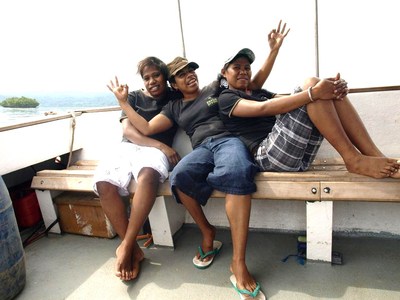
Staff on boat excursion with Max and guests on their day off.
Two kitchen help, both women, had expressed interest in becoming dive guides and today they are being trained for this career prospect. It is no wonder that there is a deep sense of belonging among the staff at Max’ resorts.
Sustainable Clam Trade
Giant clams are a delight to behold in a number of the dive sites around Raja Ampat. These, however, are taken away by local fishermen and sold as food. Clams, like fish, are an important source of nutrition for Indonesians.
Once Max had bought 10 giant clams from a fisherman for US$80, and then released them. But he realized that couldn’t keep doing that.
Max now has an idea. By introducing a clam farm, Papuans will learn how to grow clams and sell them in a sustainable fashion and will soon learn to leave the giant clams in dive sites alone.
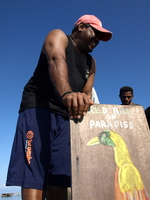
An ecology treat awaits the Papuan explorer.
Other plans afoot are homestays and kayaking adventures around the exotic mushroom islands. This augments what he has already established with the locals – bird watching tours in particular the Red Bird of Paradise. Proceeds go entirely to the villagers, who then see the value of this tourism activity and stop them from catching these birds and selling them overseas as exotic pets.
A trip to Max Ammer’s resorts is worth every dime. If you plan a trip in 2010, you may just enjoy his other service, a live aboard dive boat, one which he hopes to start designing soon - and by himself of course.
Photography by: Scotty Graham, BittenBySharks.com and Mallika Naguran. Have a chuckle reading Scotty Graham's photo blog.
Up next, destination stories on Raja Ampat and Kri Island.
More information on Kri Eco Resort, Sorido Bay Resort and Papua Diving at:
Sorong Office:
PT Papua Diving
Jalan Gunung Tidar No.1
Kampung Baru Sorong
PAPUA - 98413 Indonesia
Phone: +62 (951) 328 038
Fax: +62 (951) 328 038
info@papua-diving.com
Contact Max at max@papua-diving.com
This trip was kindly sponsored by SilkAir (from Singapore to Manado, Indonesia) and Express Air (from Manado to Sorong).
About Silkair
Singapore-based SilkAir flies one of the youngest fleets in the Asia region, with an average age of 5.5 years. It operates fifteen aircraft, nine Airbus A320-200 and six Airbus A319-100 aircraft. SilkAir positions itself as a premium, short-to-medium haul regional carrier offering unique appeal amongst leisure and business travelers in Asia. Visit www.silkair.com for more information.
In conjunction with its 20th anniversary celebrations, SilkAir recently announced the adoption of Friends-International, an award-winning Non-Governmental Organization (NGO) which focuses on reducing the number of street children across Asia and beyond, as its official charity. Sharing Friends-International’s vision to give children access to education, SilkAir will offer two children from the NGO’s vibrant Phnom Penh headquarters SilkAir Scholarships to study English at the Australian Centre for Education in the Cambodian capital.
About Express Air
The gateway to East Indonesia with daily schedule service from Jakarta to Makassar, Ternate, Sorong dan Jayapura. Its route network includes other new destinations within Papua such as Kaimana, Fak-Fak, Manokwari, Nabire, Tanah Merah, Babo etc.
Express Air has six 32 seats Dornier 328 turbo-prop, a modern advance high performance aircraft with latest technology on board to serve number of destinations along West-East Papua axis, Sulawesi, Maluku, and Nusa Tenggara.